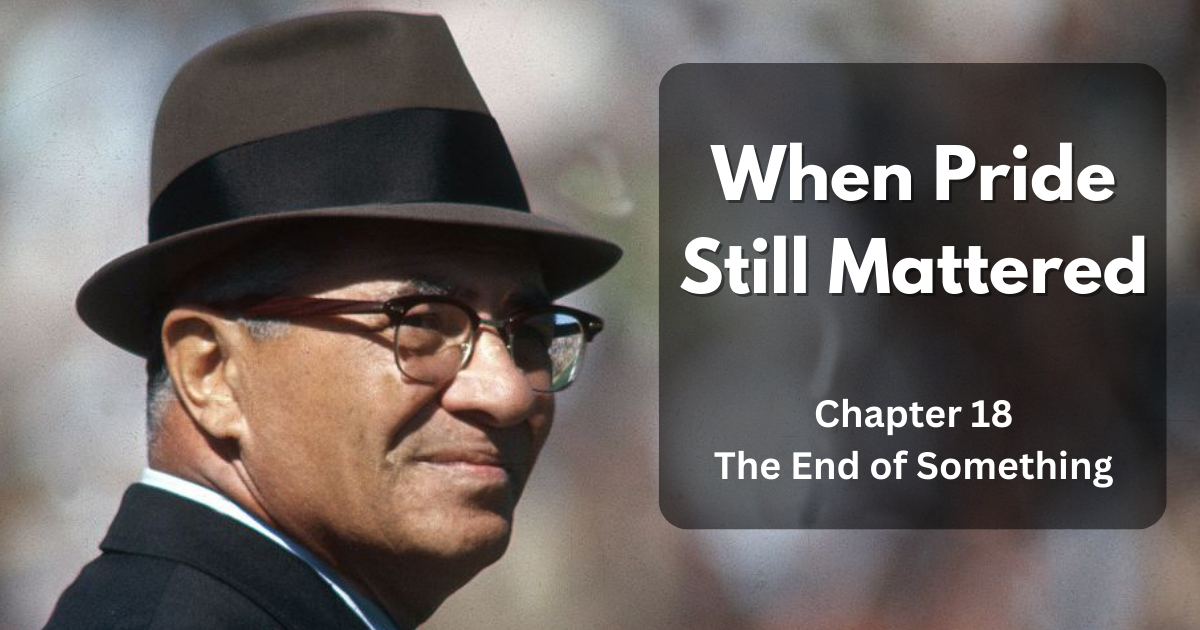When Pride Still Mattered Chapter 18 — The End of Something
I don’t know why, but I’m fascinated with the end of things. As a Packers fan, I can’t imagine what long-running retirement and/or trade scenarios with star quarterbacks could have created such an obsession, but it’s there, and it’s ever-present.
This obsession manifests in what I consider a bit of a weird way: I’m determined to find when things “really” ended for long-running franchises, be they TV shows or sports franchises. Yes, a particular show or era or what have you may have officially ended on a given day, but when was the real day it ended, either the last high water mark or the day things began to unravel for good.
For instance, on Blue 58 I’ve often described last year’s Week 9 loss to the Lions as the “real” end of the Aaron Rodgers era in Green Bay. Rodgers threw three interceptions that day in an overall sloppy affair that also saw the Packers lose Rashan Gary and Eric Stokes for the season and Romeo Doubs for most of the second half of the season. The rest of 2022 was more or less just an exercise in staving off the inevitable, but Week 9 all but sealed their fate and showcased a battered and bruised Rodgers looking completely disengaged.
(For a non-Packers example, my wife and I recently completed another tour through Parks and Rec, one of our favorite TV shows. I’d argue that although the show carried on for another season and a half, the “real” series finale was episode 13 of season 6. That episode ends with camera movement unlike anything else we see in the show, culminating on a dramatic shot of the city where it takes place. There’s literally nothing else like it in the show, and it caps an emotional arc that began in the first episode of the show. Also, on an unrelated note, Leslie Knope is the villain of Parks and Rec. But that’s a topic for another day.)
Anyway, with that as a background, I was really intrigued by the premise of this chapter. Maraniss characterizes the Packers’ 1962 championship as “the end of something,” and I think he’s right to do so.
On one hand, that seems like a strange claim to make. The end? From a historical perspective, Lombardi and the Packers were just getting started. 1962 was only Lombardi’s fourth year in Green Bay, and he still had three more titles to win. It’s hard to call championship number two any kind of end.
But on the other, I think you can plausibly argue that this was the end of the “powerhouse” era for the Packers. It’s true, Lombardi’s Packers would three-peat as NFL champions from 1965-67, but by most measures those teams were not the equal of the 1961 or 1962 squads, and the war of attrition would begin shortly after the ‘62 title game. Paul Hornung would be the first to fall, suspended for betting on NFL games. He would return, but would never be the same.
I think that’s really what Maraniss is going for here: the Packers, though great (and wildly successful, it should repeatedly be pointed out) were never again as good as they were in 1962. That they continued to win was a testament to both their talent and to Lombardi. But after 1962, their highest point had passed.
Interesting notes
This chapter once again touches on Lombardi’s strained relationship with his family, particularly his daughter. It must have been just as hard for Lombardi to relate to her as otherwise, though I’d argue the burden lays on the father to connect with his children. Surely he’d have known that Susan didn’t have much of an interest (or future) in pro sports. Couldn’t he find something, anything, to bond with her over?
Sometimes all it takes to be successful is to recognize one simple thing before anybody else does. In Pete Rozelle’s case, that means recognizing football’s perfect relationship with TV and capitalizing on it. By the time baseball figured out it needed to cultivate a similar relationship, the war for American attention was already over.
I will never not be amazed at the name Yelberton Abraham Tittle. It doesn’t get any better than that.
One of the best things — one of the essential things, I’d argue — about football is its relationship to the weather, and that’s on full display in this chapter. The brutal wind and frozen field of the 1962 championship made for truly awful playing conditions. I feel like I handle the cold pretty well, generally speaking, but the descriptions in this chapter had me shivering.
Seriously, the field must have been abysmal. Check out how the ball bounces on the opening kickoff. That is a HARD playing surface.

